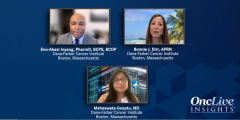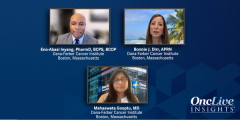
Challenges with Early Diagnosis of GVHD
Mahasweta Gooptu, MD shares insights on the early identification and diagnosis of chronic GVHD.
Episodes in this series

Transcript:
Bonnie J. Dirr, APRN:In terms of identifying some of the main challenges for recognizing patients early on, are there some other factors that you could point out to our community and to our audience that become factors for identifying and pointing out and teasing out patients that may be developing early chronic graft-vs-host disease [GVHD]?
Mahasweta Gooptu, MD:...We typically see chronic GVHD develop after the first 100 days. I perhaps have had just 1 patient who developed oral chronic GVHD exactly on day 100, but typically it’s after that, and 90% of the cases will develop in the first year. What I do toward the end of the 100 days is give them a very detailed overview to remind them that these are some of the symptoms that come up, which you may ignore otherwise. But we want you to tell us if you develop these symptoms, which are some of the ones we just alluded to, soreness and grittiness in the eyes or changes in taste or sensation or tolerance to spicy food. Any restrictions in flexibility. We do our palm sign, etc, when we examine them. Also, any changes in the skin, any changes in weight, which is unexpected. We do counsel them about symptoms that could develop. I think that is one way to catch these early, because if the patient will report it to you…
Bonnie J. Dirr, APRN: Thank you. I think some of the written literature that is also provided for patients and families that we all provide, as a nurse practitioner as well as our physician colleagues and certainly with NOs and our clinical pharmacist. They always have a reference that they can always go back to. I think that that is also helpful in the binder that we provide with them early on in their transplant journey.
Transcript is AI-generated and edited for clarity and readability.






































